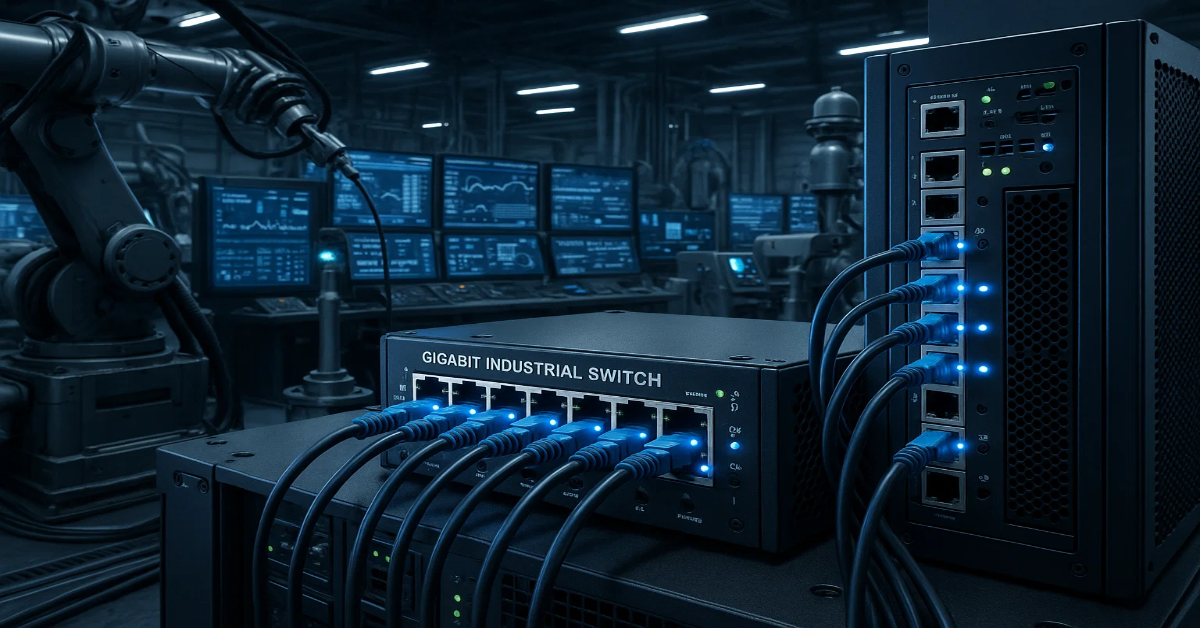In today’s hyper-connected industrial environments, robust network infrastructure is no longer optional; it’s essential. From manufacturing plants and warehouses to transportation hubs and energy facilities, operations rely heavily on seamless communication between machines, sensors and control systems. This makes Gigabit industrial switches a critical investment for businesses aiming to enhance performance, reliability and scalability in their networks.

This article explores why Gigabit industrial switches are worth the investment, detailing their benefits, use cases and long-term value, all in an easy-to-understand format while adhering to SEO and readability standards.
Understanding Gigabit Industrial Switches
A Gigabit industrial switch is a networking device designed to operate in harsh environments while providing high-speed Ethernet connectivity of up to 1 Gbps per port. Unlike regular commercial switches, industrial switches are built to withstand extreme temperatures, vibrations, dust, moisture and electrical interference.
These switches are widely used in industrial automation, smart manufacturing, traffic management systems, oil and gas facilities and other mission-critical applications where network failure is not an option.
Features:
- Gigabit Speed (1 Gbps or more): Ensures fast data transfer between devices and systems.
- Rugged Design: Resistant to extreme temperatures, dust and vibrations.
- Redundant Power and Network Paths: Minimise downtime during power failures or link disruptions.
- Managed Capabilities: Enables advanced features like VLANs, QoS and traffic prioritisation.
Why Businesses Should Invest in Gigabit Industrial Switches
1. Enhanced Network Performance
High-speed Gigabit connections allow for rapid communication between industrial devices. Whether it’s transferring real-time sensor data or handling large volumes of machine-to-machine traffic, a Gigabit industrial switch eliminates network bottlenecks, ensuring smooth operations.
For example, in a smart factory, multiple sensors and PLCs (Programmable Logic Controllers) transmit data simultaneously. A standard 100 Mbps switch may struggle under heavy traffic, resulting in delays or packet loss. Upgrading to a Gigabit industrial switch provides the bandwidth required to maintain optimal performance.
2. Improved Reliability in Harsh Environments
Industrial facilities are not office-friendly environments. High temperatures, vibrations, dust and electromagnetic interference can affect standard switches, leading to failures and costly downtime.
Gigabit industrial switches are built to:
- Operate in extreme temperatures (often -40°C to 75°C).
- Resist shocks and vibrations common in factories and warehouses.
- Withstand moisture and dust, with IP-rated enclosures in some models.
Investing in ruggedised switches reduces maintenance costs and ensures continuous network uptime.
3. Support for Critical Applications
Modern industrial operations rely on time-sensitive data for process control and monitoring. Applications like SCADA (Supervisory Control and Data Acquisition), video surveillance and automated machinery require low latency and high reliability.
Gigabit industrial switches provide deterministic network performance, which is crucial for:
- Real-time monitoring and control of industrial processes.
- Seamless video streaming for security and inspection systems.
- Fast and reliable data transfer between servers, workstations and IoT devices.
By minimising lag and packet loss, these switches help maintain operational efficiency and safety.
4. Scalability and Future-Proofing
Industrial networks are evolving rapidly. As IoT devices, sensors and automated systems proliferate, network demands increase. Investing in Gigabit industrial switches ensures your infrastructure can handle growth without constant upgrades.
Some benefits of scalability include:
- Easy addition of devices without slowing down the network.
- Compatibility with higher-speed uplinks for backbone integration.
- Support for advanced features like VLAN segmentation, QoS and redundancy protocols.
Future-proof networks reduce the total cost of ownership by avoiding frequent equipment replacements.
5. Advanced Management and Security Features
Managed Gigabit industrial switches offer sophisticated tools to optimise network performance:
- VLANs (Virtual LANs): Segment traffic for better control and security.
- QoS (Quality of Service): Prioritise critical traffic, ensuring essential systems get bandwidth first.
- Redundant Links: Using protocols like RSTP or MSTP to prevent network downtime.
- Network Monitoring: Identify issues proactively through SNMP and logging features.
These capabilities are particularly valuable in environments where downtime or security breaches can have severe operational or financial consequences.
6. Cost Efficiency in the Long Run
While Gigabit industrial switches may have a higher upfront cost compared to standard switches, they deliver long-term savings by:
- Reducing network downtime and associated productivity losses.
- Minimising maintenance and replacement costs thanks to rugged construction.
- Supporting future expansions without additional hardware upgrades.
- Enhancing operational efficiency through reliable, high-speed connections.
In short, the investment pays for itself by avoiding hidden costs and supporting smooth industrial operations.
Use Cases of Gigabit Industrial Switches
Manufacturing and Automation
Modern manufacturing plants rely on real-time data from PLCs, robots and sensors. Gigabit industrial switches enable uninterrupted communication, ensuring production lines operate efficiently without delays.
Smart Warehousing
Automated warehouses with robotic picking systems, conveyors and RFID scanners need high-speed connectivity. Gigabit switches provide reliable data transfer for inventory management and real-time tracking.
Transportation and Traffic Management
Traffic control systems, smart rail networks and airport operations require low-latency communication. Industrial switches ensure safety and efficiency by maintaining uninterrupted network performance.
Oil, Gas, and Energy
Remote monitoring and control of pipelines, refineries and power plants depend on rugged switches capable of withstanding extreme environmental conditions.
Choosing the Right Gigabit Industrial Switch
When selecting a switch, consider:
- Port Count and Speed: Ensure it meets current and future network requirements.
- Managed vs Unmanaged: Managed switches provide advanced features; unmanaged switches are simpler but less flexible.
- Environmental Ratings: Look for temperature, vibration and IP ratings suitable for your facility.
- Redundancy Support: Features like dual power supplies and network failover enhance reliability.
- Vendor Support and Warranty: Choose reputable brands that offer technical support and long-term warranties.
Gigabit industrial switches are more than just networking devices; they are an essential backbone for modern industrial operations. By offering high-speed performance, reliability in harsh environments, advanced management and future-proof scalability, they provide significant long-term value for businesses.
